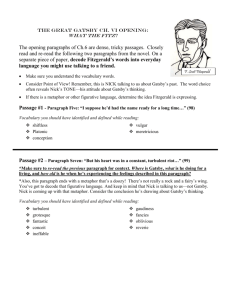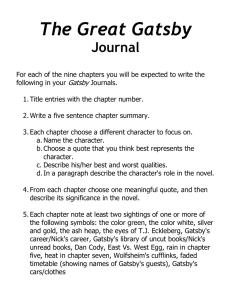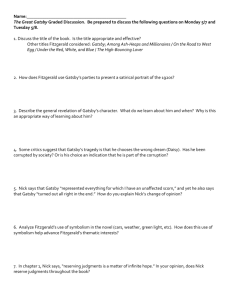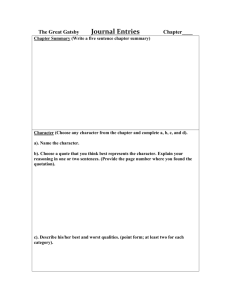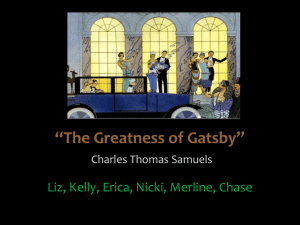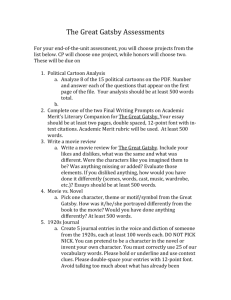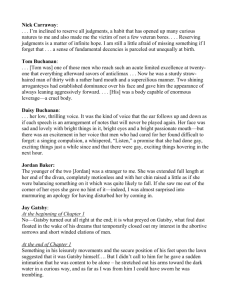Chapter III - WordPress.com
advertisement
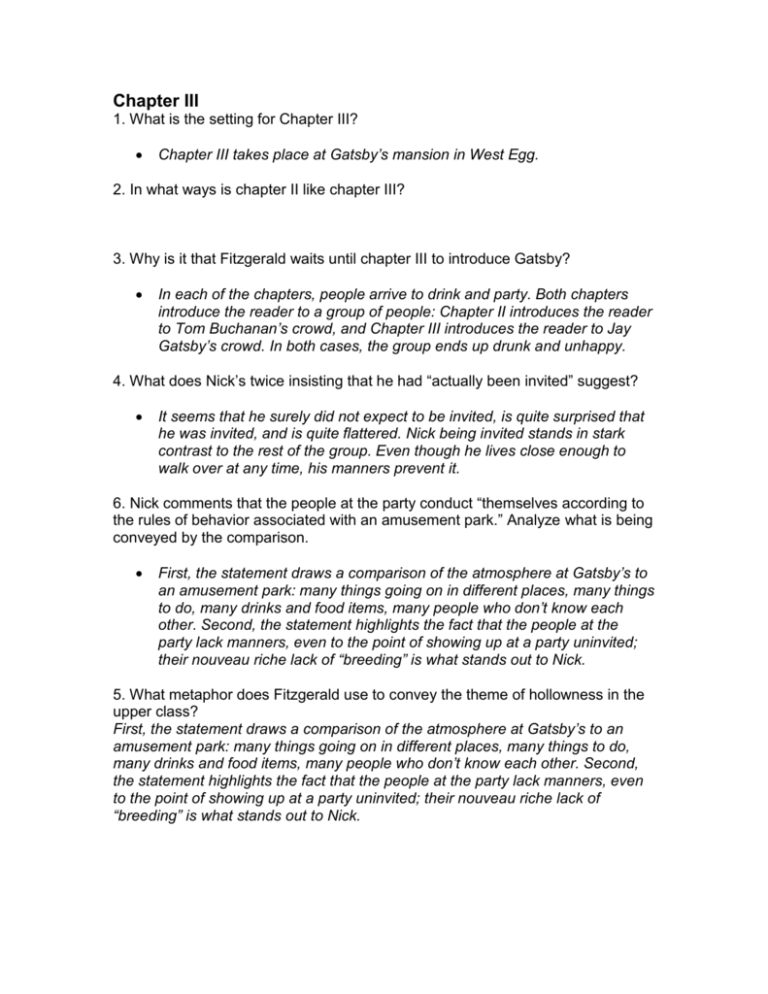
Chapter III 1. What is the setting for Chapter III? Chapter III takes place at Gatsby’s mansion in West Egg. 2. In what ways is chapter II like chapter III? 3. Why is it that Fitzgerald waits until chapter III to introduce Gatsby? In each of the chapters, people arrive to drink and party. Both chapters introduce the reader to a group of people: Chapter II introduces the reader to Tom Buchanan’s crowd, and Chapter III introduces the reader to Jay Gatsby’s crowd. In both cases, the group ends up drunk and unhappy. 4. What does Nick’s twice insisting that he had “actually been invited” suggest? It seems that he surely did not expect to be invited, is quite surprised that he was invited, and is quite flattered. Nick being invited stands in stark contrast to the rest of the group. Even though he lives close enough to walk over at any time, his manners prevent it. 6. Nick comments that the people at the party conduct “themselves according to the rules of behavior associated with an amusement park.” Analyze what is being conveyed by the comparison. First, the statement draws a comparison of the atmosphere at Gatsby’s to an amusement park: many things going on in different places, many things to do, many drinks and food items, many people who don’t know each other. Second, the statement highlights the fact that the people at the party lack manners, even to the point of showing up at a party uninvited; their nouveau riche lack of “breeding” is what stands out to Nick. 5. What metaphor does Fitzgerald use to convey the theme of hollowness in the upper class? First, the statement draws a comparison of the atmosphere at Gatsby’s to an amusement park: many things going on in different places, many things to do, many drinks and food items, many people who don’t know each other. Second, the statement highlights the fact that the people at the party lack manners, even to the point of showing up at a party uninvited; their nouveau riche lack of “breeding” is what stands out to Nick. 6. Explain the meaning of the statement “…the scene had changed before my eyes into something significant, elemental, and profound.” (Pg. 47) Nick makes this statement after drinking a bit too much champagne. When sober, the scene around him has no significance, but through the haze of alcohol, the same scene now seems steeped in meaning. Fitzgerald’s deeper meaning, perhaps, is that minus the alcohol, the Jazz Age has little significance. 7. What do Gatsby and Nick have in common? They were both in the Third Division in France, during the war. 8. What does Fitzgerald subtly wish to convey about Gatsby when he has Nick say, “…I was looking at an elegant young roughneck, …whose elaborate formality of speech just missed being absurd. Some time before he introduced himself I’d got a strong impression that he was picking his words with care”? (Pg. 48) The Dictionary of American Slang defines roughneck as “an ill-mannered rough person: a rowdy, a tough guy, or hard guy.” Since we have seen nothing ill mannered or rowdy about Gatsby, we can assume that Fitzgerald means to suggest that, despite Gatsby’s elegant dress and appearance, there is something hard-looking about him. That he is “picking his words with care” suggests he is speaking in a manner that is not entirely natural to him, a manner with which he is not comfortable, or one which his family has not taught to him. 9. Although there are many rumors regarding Gatsby, there is a clue given to the reader about what the nature of Gatsby’s work may be. What is the clue? What might it indicate is his work? The clue comes in the statement “ …a butler hurried toward him with the information that Chicago was calling him on the wire.” (Pg. 48) Chicago was the seat of organized crime and bootlegging in the 1920s. The reader begins to see past the rumors and discern that perhaps Gatsby came by his money, at least partially, as a bootlegger. 10. In what way is Gatsby’s behavior at his party quite unlike the behavior of most of his guests? He does not drink, and his behavior becomes more correct as the evening progresses. Rather than dancing, singing, and partying, he seems to stay aloof from most everyone. 11. Explain the symbolism of the simile, on page 51“…at intervals she appeared suddenly at his side like an angry diamond, and hissed: ‘You promised!’ into his ear.” As a diamond has many facets, so does this simile. The diamond, a symbol of forever love, a promise of undying love, is being challenged by a flirtatious, young actress and the husband of the woman speaking. His wife was once the diamond of his life and, as her position is challenged, the sharpness of the diamond, the cutting aspects of the diamond, are exposed. The diamond sharply reminds him, “You promised!” 12. What is the significance of the phone calls that Gatsby receives? How does it add to the development of his character? What does the lack of calls to Buchanan demonstrate? Gatsby receives phone calls at different points throughout the book seeming to be business calls of some kind. It is evident that he is working and building his financial base. These calls add mystery to his background as they are from Philadelphia, and later in the book Chicago, both cities boasting seats of organized crime. Buchanan doesn’t receive business phone calls, and in fact, never seems to have work to do. His money is old and secure. 13 What does the author do to convey the idea that the gentleman driving the car is drunk? He changes the speech pattern, uses many misspelled words, and has him speak illogically 14. The first three chapters span what time period? The first three chapters cover in depth three nights that are several weeks apart. 17. In the final paragraph on page 55, how does the viewpoint change? How is this accomplished? What is the purpose? Nick steps out of the action of the story and fi lls the reader in on other happenings. The reader sees that Nick has been diligently at work leading quite a normal life and that the three parties spoken of were not the norm for him. Nick adds to his credibility. 19. What is the second ugly character flaw revealed about Jordan? How does this affect the reader? She is a chronic liar. She lies in her private life as well as in her public life as an athlete. The reader has been warned and should not take anything she says to heart. 20. What do you think Fitzgerald wishes to convey about Gatsby’s parties through the incident with the drunks and the car, and the husbands and wives arguing? Fitzgerald is showing that, when the materialistic trapping of wealth are not considered, the rich behave no differently than the lower classes 21. What is revealed about Nick’s character? Nick is desperately honest. He can’t even date two women at the same time without feeling guilty. The relationship Nick has with the reader is strengthened by his honesty. The reader now believes Nick to be a credible narrator. 22. How does the motif of geography in the novel help shape its themes and characters? The four motifs of geography correspond with a particular theme or type of character encountered. West Egg is represents “new money,” like Gatsby, and symbolizes the emergence of the newly established aristocracy of the 1920s. East Egg symbolizes the old upper class that continues to dominate American social life. The valley of ashes is desolate and desperate, like George Wilson, symbolizing the decay of American society hidden behind the facade of a glittering upper class. New York City is an example of the chaos that Nick perceives in the East. Setting reinforces the themes and characters throughout the entire book.
